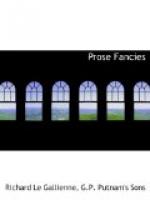THE WOMAN’S HALF-PROFITS
O ma pauvre Muse! est-ce toi?
Fame in Athens and Florence took the form of laurel; in London it is represented by ‘Romeikes.’ Hyacinth Rondel, the very latest new poet, sat one evening not long ago in his elegant new chambers, with a cloud of those pleasant witnesses about him, as charmed by ‘the rustle’ of their ‘loved Apollian leaves’ as though they had been veritable laurel or veritable bank-notes. His rooms were provided with all those distinguished comforts and elegancies proper to a success that may any moment be interviewed. Needless to say, the walls had been decorated by Mr. Whistler, and there was not a piece of furniture in the room that had not belonged to this or that poet deceased. Priceless autograph portraits of all the leading actors and actresses littered the mantelshelf with a reckless prodigality; the two or three choice etchings were, of course, no less conspicuously inscribed to their illustrious confrere by the artists—naturally, the very latest hatched in Paris. There was hardly a volume in the elegant Chippendale bookcases not similarly inscribed. Mr. Rondel would as soon have thought of buying a book as of paying for a stall. To the eye of imagination, therefore, there was not an article in the room which did not carry a little trumpet to the distinguished poet’s honour and glory. Hidden from view in his buhl cabinet, but none the less vivid to his sensitive egoism, were those tenderer trophies of his power, spoils of the chase, which the adoring feminine had offered up at his shrine:




